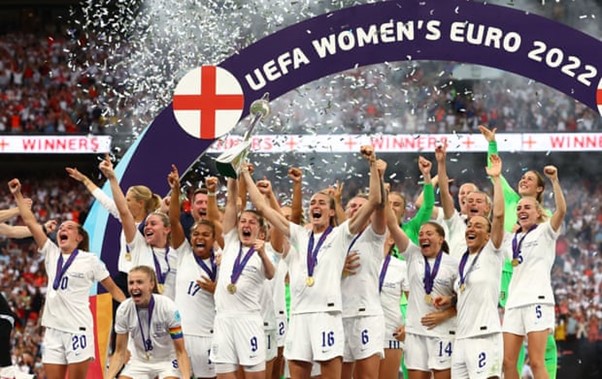Even more, it was accomplished by England’s fantastic success in the Women’s Euro 2022 tournament final than by the men’s team in their Euro finals the previous year. Both teams inspired and brought the nation together, but now that the women have won the title, they have managed to advance far further than the men.
More boys were probably inspired to play soccer at the park, on the school field, or by Gareth Southgate’s team. However, Sarina Wiegman’s Lionesses have served the country even more by resoundingly proclaiming that football is unquestionably not “only for the lads.”
The Lionesses’ success will endure for a long time and, ideally, be permanent. It means more than just the magnificent celebration of a single match; it also means a string of outstanding performances and putting a smile on the face of a nation through an economic crisis.
Women’s football has rapidly expanded in the UK recently; the Women’s Super League only became entirely professional four years ago. However, the past four weeks will undoubtedly serve as rocket fuel because of the record-breaking 87,000 spectators who attended the women’s European final at Wembley and the record-breaking TV viewing numbers for the tournament.
It has been a brutally lengthy trek to the top of a mountain that has been scaled in challenging circumstances. In Crouch End, north London, a match between women’s “association football” players took place for the first time. During World War I, women were considered strong enough to work in the munitions factories. Still, as women’s football gained popularity in the years that followed, the Football Association decided to outlaw such games in 1921, stating that “the game of football is quite unsuitable for females and ought not to be encouraged.”
One group that disobeyed the order was the avant-garde Manchester Corinthians Ladies Football Club, which participated in worldwide tours in the 1950s and 1960s.
Hopefully, England’s victory will dispel the myth that women’s sports are inferior to men’s sports, a myth that is frequently tinged with sexism. Unfortunately, not much has changed from the early 20th-century belief that a woman’s place was in the house rather than on the field. According to recent academic studies, such a bias is still present, with some males opining that women should adhere to “feminine” sports like athletics.
Euro 2022 has shown that the women’s version of the game is, in some respects, more visually appealing. Female players trying to trick the referee into awarding them a free kick or a penalty by screaming in agony or doing a dive Tom Daley would be proud of are less common than male players. According to statistics from Euro competitions, men averaged 24 fouls per game while women averaged 20. Men also got 2.7 yellow cards while women averaged 1.6.
Ms Wiegman, whose home, the Netherlands, won the Euros in 2017 and has now brought the same tactical acumen to England, had elevated the people-management abilities that the former international Phil Neville brought to the England women’s squad when he was their manager.
The women’s game still has an opportunity for development. Compared to the men’s squad, the number of Black players in the current England lineup has drawn criticism from commentators. Mark Sampson, a former manager, was charged with uttering racist statements. Many people worry that Black females with skills are being left out of football academies because they are not as inclusive as they should be.
Football players’ salaries should be equalized for male and female players. Although pay scales are unknown, the market worth of the England women’s squad is projected to be £2.4 million, as opposed to the men’s team’s estimated £1.2 billion.
It’s time to reconsider your assessment of the Lionesses, who have served as excellent role models on and off the field in a way that shames certain Premier League players.
Above all, the England women’s team deserves our sincere admiration and gratitude because they will motivate a new generation of girls to strive for the stars in life and sport, not simply by encouraging them to play the beautiful game.





Comments are closed.